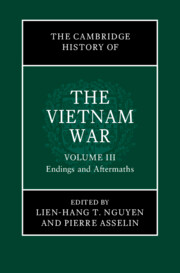Book contents
- The Cambridge History of the Vietnam War
- The Cambridge History of the Vietnam War
- The Cambridge History of the Vietnam War
- Copyright page
- Contents
- Figures
- Maps
- Contributors to Volume III
- General Introduction
- Introduction
- Part I The Late Vietnam War
- Part II The Postwar Era
- Part III Legacies
- 20 The Vietnam War and International Law
- 21 Environmental Legacies of the Vietnam War
- 22 The Vietnamese Diaspora
- 23 The Vietnam War in Vietnamese Official and Personal Memory
- 24 The Vietnam War in American Culture
- 25 The Specter of Vietnam
- 26 Vietnam’s Search for Its Place in the World
- Index
25 - The Specter of Vietnam
from Part III - Legacies
Published online by Cambridge University Press: 02 January 2025
- The Cambridge History of the Vietnam War
- The Cambridge History of the Vietnam War
- The Cambridge History of the Vietnam War
- Copyright page
- Contents
- Figures
- Maps
- Contributors to Volume III
- General Introduction
- Introduction
- Part I The Late Vietnam War
- Part II The Postwar Era
- Part III Legacies
- 20 The Vietnam War and International Law
- 21 Environmental Legacies of the Vietnam War
- 22 The Vietnamese Diaspora
- 23 The Vietnam War in Vietnamese Official and Personal Memory
- 24 The Vietnam War in American Culture
- 25 The Specter of Vietnam
- 26 Vietnam’s Search for Its Place in the World
- Index
Summary
The fighting stopped in 1975 with Hanois victory. But the battle for the hearts and minds of the American people continued and was propelled by politicians manipulating the mythical cause of POWs/MIAs. Postwar movies filled out the scenario of a war lost because of poor leadership in Washington combined with the baleful influence of the anti-war movement. Presidents wrestled with the legacy of Vietnam, including the controversy over the national Vietnam Memorial. Gerald Ford and Jimmy Carter both attempted to move the nation beyond the grasp of the Vietnam Specter. Both failed. Ronald Reagan used it to help him win the presidency in 1980, after the debacle that followed the occupation of the American Embassy in Tehran, which only seemed to emphasize the nations lost claims to world leadership after Vietnam. George H. W. Bush claimed that it had been buried in the sands of Iraq after the rapid victory in Gulf War I. Bill Clinton succeeded in establishing diplomatic and economic relations with Vietnam. But it re-emerged with renewed force during the Second Gulf War and the never-ending war in Afghanistan. Even today it shapes much thinking about military interventionism.
Keywords
- Type
- Chapter
- Information
- The Cambridge History of the Vietnam War , pp. 561 - 587Publisher: Cambridge University PressPrint publication year: 2024

